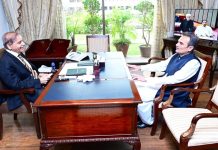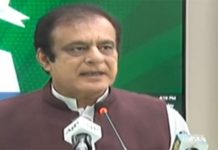Begum Samina Alvi, the wife of President of Pakistan on Wednesday said a system of nationwide registration of di
fferently-abled people was crucial to ensure their access to the facilities provided by the government, particularly in the areas of education and health.
“The registration will help categorization of di
fferently-abled persons and ensure them facilities as per their disability and individual needs,” she said in her address at virtual Policy Roundtable themed ‘Mainstreaming Interventions to address Disabilities in the National Youth Priority Action Agenda (NYPA)’.
Federal Minister for Human Rights Dr Shireen Mazari, parliamentarians, experts on disability, representatives of World Health Organization (WHO) and officials of Ministry of Planning, Development and Special Initiatives participated via video-link.
Begum Alvi said a survey about di
fferently-abled people being conducted under Ehsaas socio-welfare programme would be completed by June, however stressed that inclusion of such persons in census was equally important for their accurate categorization.
“This data can guide the government in allocating special resources for health and education facilities for di
fferently-abled people,” she added.
She said one in seven people worldwide had a disability, adding that by 2050, the population over 60 years of age would touch two billion needing physical aid.
She said an estimated 15 percent of the world’s population suffered from some form of disability and according to preliminary estimates, Pakistan had the same percentage of its population with disabilities.
Begum Alvi stressed the need for measures to ensure access and mobility of di
fferently-abled people so as to integrate them into the social mainstream.
She called for raising aw
areness through seminars and media about the lo
an facility offered by State Bank of Pakistan and other private banks aimed at making the di
fferently-abled people financially independent.
She said provision of skill-based educat
ion in line with market needs and equipped with knowledge information technology could prove helpful in enabling di
fferently-abled persons to start their own businesses.
Well-being of persons with disabilities was a matter close to her heart and mentioned that she was working to create aw
areness about the subject, she added.
She called for a national campaign run by the Ministry of Information, digital media and aw
areness drive at
school and local levels regarding availing of two percent job quota by special persons.
She said the private sector could play a positive role by employing di
fferently-abled people in their respective fields according to their skills.
These jobs, she said, should not be given under welfare but rights-based approach but be provided as per the needs of the institution, individual capacity of the di
fferently-abled person.
Begum Alvi said besides providing vocational and technical education to di
fferently-abled people, their enrollment at mainstream educational institutions was important so that they did not feel isolated in society.
“We need to make them realize that they are second to none. They are not disabled, but di
fferently-abled with special needs,” she said, adding that they could play their part in national development if given opportunities.
She expressed confidence that holding of Roundtable would lead to formulation of an inclusive policy for di
fferently-abled persons and lead to its implementation.






